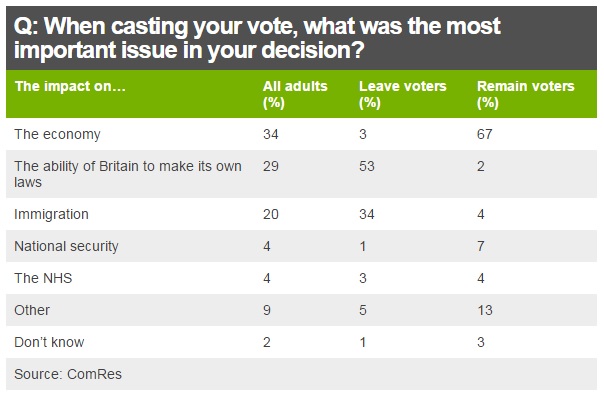Bill Clinton’s now famous saying ‘It’s the economy, stupid’ is used to highlight that voters generally consider the economy to be the most important issue at elections. But is there ever a time when that is not true?
Recent stats about the Brexit vote published by the BBC broke down the issues deemed most important to Remain and Leave voters. Remain voters thought it was the economy but Leave voters thought sovereignty was, closely followed by immigration.

It certainly makes sense that the economy is often the most important issue. People have families to care for, mortgages to pay down and a well paying secure job in a vibrant economy is the best way to get on. So the fact that Remain voters rated the economy as the defining issue in the EU referendum stands to reason. Telling a person that the economy, for once, is not the most important issue is akin to saying that there is something more important than providing for your family. Obviously that is a hard sell.
I am going to argue that one of the issues more important than the economy is liberty and sovereignty. Whilst a good economy allows you to provide for your family, liberty and sovereignty is a means of protecting your family and that is more important. Moreover it is no coincidence that those societies around the world which are most free are also the most prosperous, a vote for liberty is normally also a vote for a better economy.
Don’t be confused, ‘a decision about liberty’ is not an oxymoron. It is true that the very fact you have a vote means liberty cannot seriously be compromised, but that assumes that nothing can change and it ignores that the structures for further removal of sovereignty and liberty by the EU are in fact already in place (see here). UK voters were faced with a decision about short term economic uncertainty on the one hand from a vote to Leave, and the prospect of continued removal of sovereignty and liberty by choosing to Remain. The saying goes ‘Eternal vigilance is the price of liberty’. Vigilance is ‘the action or state of keeping careful watch for possible danger or difficulties’ and that perfectly sums up the mentality behind a vote to Leave.
Leave voters looked at the EU now and correctly judged that it posed a threat to the sovereignty and liberty of the people of Europe. For the EU, in their push for a political union on the European continent, are deliberately creating a structure of government which is undemocratic, unaccountable and without adequate checks on power. The intentions of EU leaders may be well placed, however it ignores the important lessons from history. It must be remembered that well meaning governments can and indeed do, go bad, that not everyone believes that the people should be free, and that it only takes one person to change the entire history of a continent. The structure of government shouldn’t be idealistic, it needs to define with precision how government intends to protect the rights of people, and be structured in a way which is democratic, transparent, accountable and has power distributed in the hands of the many.
Liberty unfortunately has become an abstract concept to those who live in Western democracies. We are a generation that don’t know anything but liberty and we take our sovereignty and liberty for granted because we have never had to fight for it. However when your rights of free speech, of equality, of justice under the law, of self determination, of democratic accountability, of protection against enemies foreign and domestic are eroded such that the will of others can be imposed upon you against your will – that is when you know liberty, and its value. It is why the founder fathers took such care when writing the US constitution for they paid for their liberty with blood. It is why it is with great alarm we see the EU with reckless abandon create a system of government that is undemocratic, unaccountable and with a concentration of power in the hands of un-elected bureaucrats. It is why the economy wasn’t the most important thing in the British EU referendum.
So why is it that the Leave voters got it right?
Lets not pretend that most Leave voters have an in depth understanding of the EU institutions and how it works. The Leave voters got it right because the inability of the UK government to control immigration was a perfect demonstration of how the EU works. Leave voters correctly identified that immigration was caused by the EU’s policy of free movement of labour. So when the people of the UK voted for a Conservative party that pledged to put a cap on migration, only to find out the EU could over rule their elected UK government, the penny dropped. Leave voters realised that the issue of migration was actually a much bigger issue about sovereignty.